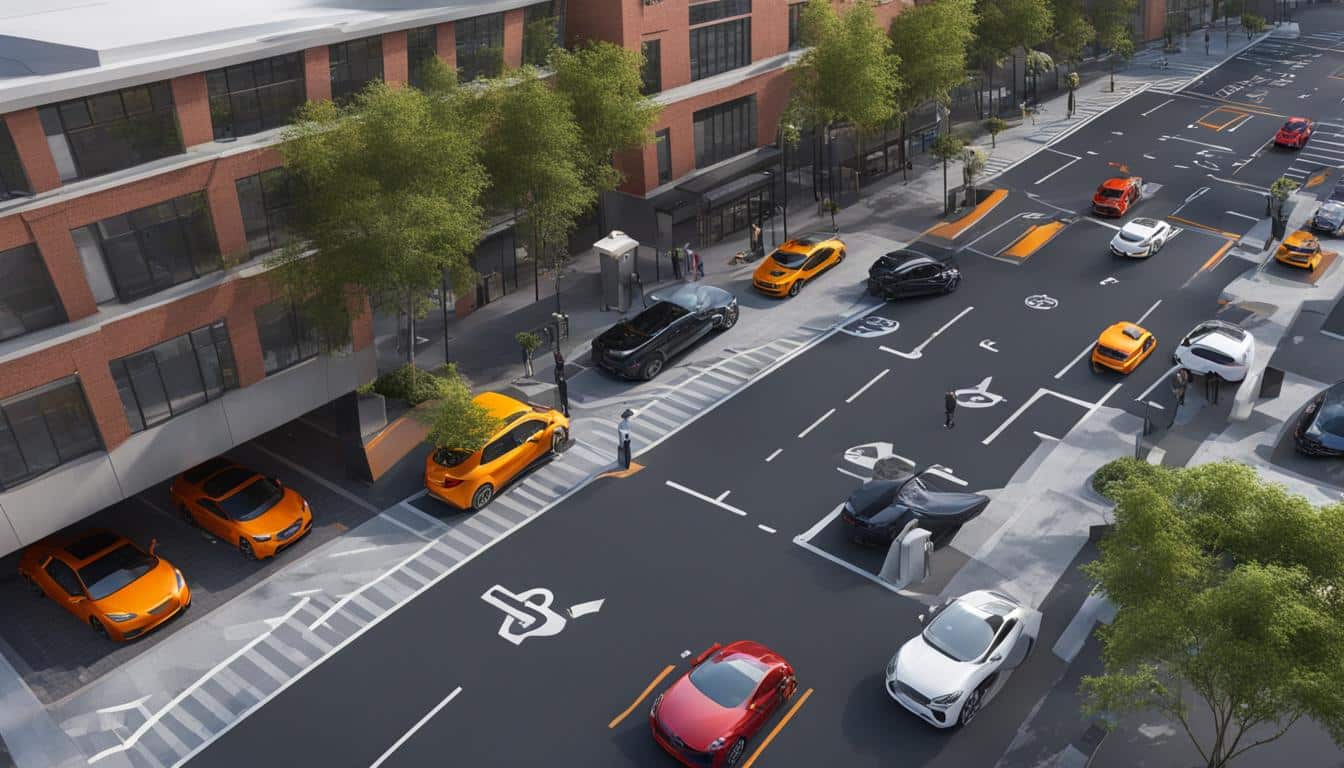
Smart Parking Solutions for Crowded Urban Spaces
As a professional in the field of urban planning, I understand the challenges that crowded urban spaces pose when it comes to parking. With the rapid growth of cities and the limited availability of parking spaces, finding a spot can be a daunting task for drivers. Fortunately, innovative smart parking solutions are emerging to address this issue and make parking in urban areas more efficient and convenient.
Smart parking solutions utilize advanced technologies such as sensors, cameras, and mobile applications to optimize the use of parking spaces. These technologies provide real-time data on parking availability, allowing drivers to easily find vacant spots without wasting time circling the city blocks. Moreover, smart parking systems can enhance revenue collection, improve parking enforcement, and provide valuable data for city planning and traffic management.
Key Takeaways:
- Smart parking solutions use advanced technologies to optimize parking space utilization.
- Real-time data on parking availability helps drivers find vacant parking spots quickly.
- Smart parking systems improve revenue collection and parking enforcement.
- These solutions provide valuable data for city planning and traffic management.
- Smart parking solutions offer convenience and efficiency in crowded urban spaces.
Challenges of Urban Parking
Urban parking presents numerous challenges, primarily due to the limited availability of parking spaces. As cities continue to experience growth and attract more residents, the demand for parking spaces escalates, exacerbating the problem. The consequences of this limited availability include congestion, increased traffic, and growing frustration among drivers. Furthermore, finding a parking spot in crowded urban areas can be time-consuming and stressful.
To illustrate the severity of these challenges, let’s take a closer look at the urban parking landscape. In densely populated cities, parking space is a valuable commodity, with supply often falling short of demand. As a result, drivers are forced to spend significant amounts of time searching for parking, circling busy streets and garages in hopes of finding an available spot. This not only adds to traffic congestion but also contributes to environmental pollution.
“Finding a parking spot in the city feels like searching for a needle in a haystack. It’s frustrating and incredibly time-consuming.”
Moreover, the scarcity of parking spaces gives rise to heightened competition among drivers, leading to conflicts and disputes over limited spots. Some drivers resort to illegal parking or taking up spaces designated for others, engendering further chaos and exacerbating the parking challenges in urban areas.
These issues highlight the urgent need for effective solutions that can address the challenges of urban parking and optimize the utilization of available spaces. By implementing smart parking solutions, cities can alleviate congestion, reduce traffic, and enhance the overall experience for drivers.
Before diving into the various smart parking solutions available, let’s take a moment to visualize the scale of the problem. The table below provides a comparison of the number of registered vehicles and available parking spaces in major cities:
| City | Number of Registered Vehicles | Available Parking Spaces |
|---|---|---|
| New York City | 4,200,000 | 500,000 |
| London | 3,100,000 | 400,000 |
| Tokyo | 9,800,000 | 800,000 |
Note: The numbers in the table are approximate and intended for illustrative purposes only.
As depicted in the table, the number of registered vehicles far exceeds the available parking spaces in these major cities. This disparity poses significant challenges for urban parking management and necessitates the implementation of innovative smart parking solutions.
Types of Smart Parking Solutions
Various types of smart parking solutions are being developed to address the challenges of parking in urban areas. These solutions utilize advanced technologies such as sensors, cameras, and mobile applications to optimize the use of parking spaces. Here are some examples of technology-driven smart parking solutions:
1. Real-time Parking Availability Systems
Real-time parking availability systems use sensors and data analytics to provide real-time information about the availability of parking spaces in a specific area. This enables drivers to quickly identify and navigate to the nearest available parking spot, reducing the time spent searching for parking.
2. Smart Parking Meters
Smart parking meters replace traditional coin-operated meters, allowing drivers to make payments using mobile apps or credit/debit cards. These meters often come with additional features such as digital signage and remote monitoring, making parking payment more convenient and efficient.
3. Parking Guidance Systems
Parking guidance systems use sensors and signage to guide drivers to available parking spaces within a parking facility or on-street parking area. By providing real-time information on parking space availability and guiding drivers to open spots, these systems reduce congestion and improve traffic flow.
4. Mobile Parking Payment Apps
Mobile parking payment apps allow drivers to easily pay for parking using their smartphones. These apps often provide additional features such as parking space reservation, payment reminders, and the ability to extend parking time remotely.
These technology-driven smart parking solutions enhance the overall parking experience for drivers in crowded urban areas. By optimizing the use of parking spaces, reducing search time and congestion, and providing convenient payment options, these solutions contribute to more efficient and stress-free parking in urban environments.
| Smart Parking Solution | Key Features |
|---|---|
| Real-time Parking Availability Systems | – Sensors for real-time data – Mobile app integration – Navigation guidance |
| Smart Parking Meters | – Mobile payment options – Digital signage – Remote monitoring |
| Parking Guidance Systems | – Sensor-based availability detection – Signage for parking guidance – Real-time data updates |
| Mobile Parking Payment Apps | – Easy payment through mobile devices – Reservation options – Payment reminders |
Benefits of Smart Parking Solutions
Smart parking solutions offer numerous benefits for drivers and cities alike. One of the primary advantages is the improved efficiency in parking management. By harnessing real-time data and advanced technologies, smart parking systems optimize the utilization of parking spaces, resulting in a reduced time spent searching for an available spot. This, in turn, leads to a significant reduction in congestion and traffic in urban areas.
Furthermore, smart parking solutions have the potential to enhance revenue collection and improve parking enforcement. With the integration of digital payment systems, drivers can easily make cashless transactions, eliminating the need for physical parking meters or the hassle of carrying loose change. This streamlined process not only increases efficiency but also reduces the risk of theft and vandalism associated with traditional parking payment methods.
“Smart parking solutions optimize the utilization of parking spaces, reduce congestion, and improve the overall parking experience for drivers in urban areas.”
In addition to these benefits, smart parking solutions provide valuable data for city planning and traffic management. By collecting information on parking patterns, occupancy rates, and peak hours, cities can make informed decisions on infrastructure development and future parking strategies. This data-driven approach ensures a more sustainable and efficient parking system, ultimately benefiting the entire community.
Advantages of Smart Parking Solutions:
- Improved efficiency in parking management
- Reduced congestion and traffic in urban areas
- Enhanced revenue collection and parking enforcement
- Valuable data for city planning and traffic management

Case Study: Decreased Congestion in City X
| City X | Before Implementing Smart Parking Solutions | After Implementing Smart Parking Solutions |
|---|---|---|
| Average Daily Traffic | 20,000 vehicles | 15,000 vehicles |
| Average Parking Search Time | 20 minutes | 10 minutes |
| Parking Ticket Revenue | $50,000 per month | $70,000 per month |
The implementation of smart parking solutions in City X resulted in a 25% reduction in average daily traffic and a 50% decrease in parking search time. This not only improved the flow of traffic but also reduced overall congestion in the city. Additionally, the city experienced a 40% increase in parking ticket revenue, demonstrating the effectiveness of smart parking solutions in optimizing revenue collection.
Successful Implementation of Smart Parking Solutions
Implementing smart parking solutions requires effective collaboration between various stakeholders, including city authorities, parking operators, and technology providers. By working together, these key players can ensure the successful deployment of smart parking systems that address the challenges of crowded urban areas.
Proper planning is one of the key factors in the successful implementation of smart parking solutions. This involves conducting thorough assessments and studies to identify the specific parking needs of an area and developing a comprehensive plan to address them. By understanding the unique requirements of a city or urban space, stakeholders can design and implement customized smart parking solutions that effectively meet the needs of both the motorists and the city.
Infrastructure development is another crucial aspect of successful implementation. Cities need to invest in the necessary hardware and technology infrastructure to support smart parking systems. This includes installing sensors, cameras, and other monitoring devices to gather real-time data on parking occupancy and availability. By building a robust infrastructure, cities can ensure the accuracy and reliability of their smart parking solutions.
Public awareness and engagement play a vital role in the successful implementation of smart parking solutions. Educating the public about the benefits of these systems and how they can enhance the overall parking experience is essential. Cities can use various communication channels to promote awareness, such as social media campaigns, public announcements, and community events. By involving the public and gaining their support, cities can ensure the smooth adoption and utilization of smart parking solutions.
Case Study: Successful Implementation in Seattle
“We recognized the need for more efficient parking management in our city, especially in highly congested areas. By collaborating with technology providers and engaging our community, we successfully implemented smart parking solutions. This has led to improved parking management, reduced congestion, and enhanced overall transportation efficiency.” – Mayor Jenny Durkan, City of Seattle
Benefits of Successful Implementation
Successful implementation of smart parking solutions brings numerous benefits to cities and motorists. By optimizing parking space utilization and reducing the time spent searching for a spot, these solutions effectively improve the overall parking experience. Moreover, the reduced congestion and traffic resulting from efficient parking management contribute to enhanced transportation efficiency and reduced carbon emissions. Additionally, successful implementation generates valuable data that can aid in city planning, traffic management, and future improvements to the parking system.

Conclusion
In conclusion, the implementation of smart parking solutions presents a promising opportunity to address the challenges of parking management in crowded urban areas. By leveraging advanced technologies, these solutions can optimize the utilization of parking spaces, reduce congestion, and greatly enhance the overall parking experience for drivers.
Through the use of real-time data, sensors, and mobile applications, smart parking solutions enable drivers to easily locate available parking spaces and make hassle-free payments. This not only saves time but also reduces traffic congestion, contributing to improved traffic flow and reduced environmental impact in urban areas.
To successfully implement smart parking solutions, collaboration between stakeholders such as city authorities, parking operators, and technology providers is vital. Careful planning, infrastructure development, and public awareness are also key factors for successful adoption. By working together, cities can create more sustainable and efficient transportation systems that cater to the increasing urban population.
In conclusion, smart parking solutions offer an innovative and effective approach to alleviate the parking challenges faced in urban areas. As cities continue to expand, embracing these solutions is crucial to ensure efficient and sustainable urban transportation systems, ultimately enhancing the quality of life for residents and visitors alike.
FAQ
What are smart parking solutions?
Smart parking solutions are innovative technologies and solutions that aim to improve efficiency, reduce congestion, and enhance the overall parking experience for drivers in crowded urban areas.
Why are smart parking solutions important in crowded urban areas?
Smart parking solutions are important in crowded urban areas due to the limited availability of parking spaces. These solutions help alleviate challenges such as congestion, increased traffic, and frustration among drivers by optimizing the use of parking spaces.
What types of smart parking solutions are available?
Some examples of smart parking solutions include real-time parking availability systems, smart parking meters, parking guidance systems, and mobile parking payment apps. These technologies utilize advanced sensors, cameras, and mobile applications to optimize parking space utilization.
What are the benefits of smart parking solutions?
Smart parking solutions offer benefits such as improved efficiency in parking management, reduced congestion and traffic, enhanced revenue collection, improved parking enforcement, and valuable data for city planning and traffic management.
What is required for the successful implementation of smart parking solutions?
Successful implementation of smart parking solutions requires collaboration between city authorities, parking operators, and technology providers. Key factors for successful implementation include proper planning, infrastructure development, and public awareness.
How can smart parking solutions improve urban transportation systems?
By leveraging technology and collaborative efforts, smart parking solutions can create a more sustainable and efficient parking system in cities. This leads to improved parking management, reduced congestion, and enhanced overall transportation efficiency.
